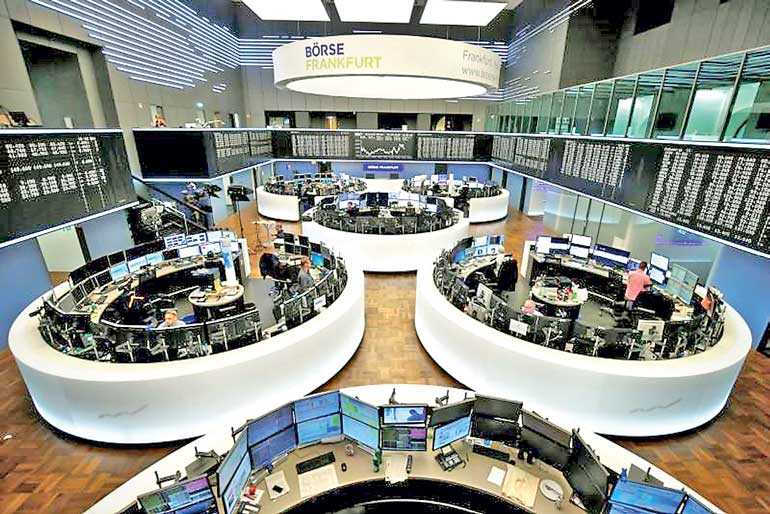Sunday Feb 22, 2026
Sunday Feb 22, 2026
Tuesday, 3 July 2018 00:00 - - {{hitsCtrl.values.hits}}

London (Reuters): A renewed slump in Chinese shares and a sobering set of global factory surveys sucked world markets lower yesterday, while the euro and Mexican peso were both jolted by political developments.
It was the first trading day of the new month, quarter and half-year but there was no let up for bruised investors after the worst start to a year for world shares since 2010.
Shanghai’s “bear” market lurch had continued overnight, with losses of up to 3% as firms await some $34 billion of US tariffs this week and new business surveys showed some worrying signs of deterioration.
Europe suffered a thud too, with the STOXX 600 share index dropping as much as 1% and the euro down 0.5% to $1.1630 as differences over immigration threatened Angela Merkel’s German coalition Government.
The trade strains meanwhile were compounded by an EU threat to hit the United States with almost $300 billion in retaliatory tariffs, lingering concerns over President Donald Trump’s dislike for the World Trade Organisation and by data showing the weakest euro zone manufacturing sector growth in 18 months.
All the concerns meant more demand for safe-haven bonds. US Treasuries and German Bund both saw buying, whereas Wall Street looked set to go lower when it reopens.
Shanghai blue chips had resumed their slide overnight with a fall of 2.9%. That, alongside another flop by the yuan hot on the heels of its weakest month on record, soured sentiment across Asia.
MSCI’s broadest index of Asia-Pacific shares outside Japan fell 0.6%, adding to a 2% drop last week.
Japan’s Nikkei shed 2.2% to an 11-week low, with a survey of manufacturers showing sentiment there had also darkened a shade in the face of trade war threats.
Tension is growing ahead of a July 6 deadline when Washington is due to impose $34 billion of tariffs on Chinese exports.
A new report from Oxford Economics warned that tariff threats, if realised, would extend high tariffs to over 4% of world imports – a more than tenfold rise versus the 0.3% of imports hit by the new tariffs imposed so far.
“The threat to world growth is significant” it said. “In a scenario of escalating tariffs, our modelling suggests world GDP could be cut by up to 0.4%age points in 2019.”
Two surveys of Chinese manufacturing out in the last few days showed a softening in activity, partly due to softness in exports.
A slew of US factory readings are due on Monday, while the US ISM report is out on Tuesday. Minutes of the last Federal Reserve policy meeting come on Thursday and the week closes with US payrolls for June.
German angst
In currency markets, the euro was knocked back on reports German Interior Minister Horst Seehofer had rejected a migration deal Merkel negotiated at an EU summit on Friday.
The currency then partly bounced on news Seehofer had offered to step down as minister and as chair of his Christian Social Union (CSU) party, only to slide back again after the euro zone manufacturing data came in weak.
Seehofer’s move makes the future of Merkel’s government even more uncertain. Her Christian Democrats (CDU) rely on the CSU to maintain power through a coalition formed three months ago to end a political vacuum.
The euro was 0.5% lower at $1.1640, having skidded as far as $1.1628 at one stage.
The US dollar gained 0.25% on a basket of currencies to 94.891, but was still below Friday’s top of 95.324. It was flat on the yen at 110.74 having been as high as 111.06 at one stage.
The Mexican peso see-sawed after leftist Andres Manuel Lopez Obrador won a decisive victory for president.
Dealers said the clear win might settle one source of political uncertainty, but Obrador was also expected to sharpen Mexican divisions with Trump.
After an initial retreat, the dollar soon rebounded to top 20 pesos, up from last week’s trough around 19.5580 per dollar.
Trump also loomed large in oil markets with crude taking a spill after he tweeted that Saudi Arabia had agreed to lift oil production by “maybe up to 2,000,000 barrels”. The missive was later played down by the White House and Saudi Press Agency.
Brent crude lost 85 cents to $78.26 a barrel, while US crude fell 30 cents to $73.88. The pullback was still modest given US crude rallied more than 8% last week, while Brent gained more than 5%.